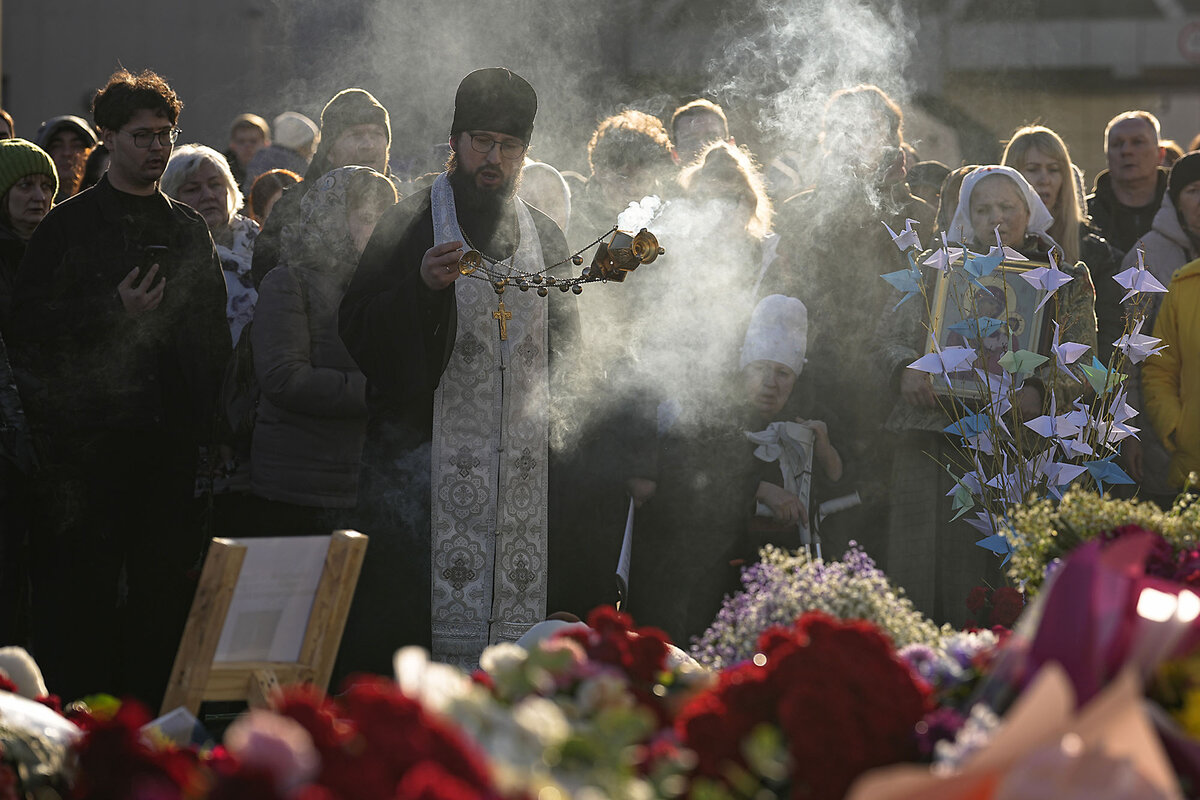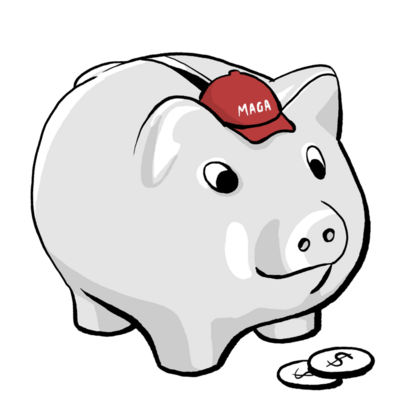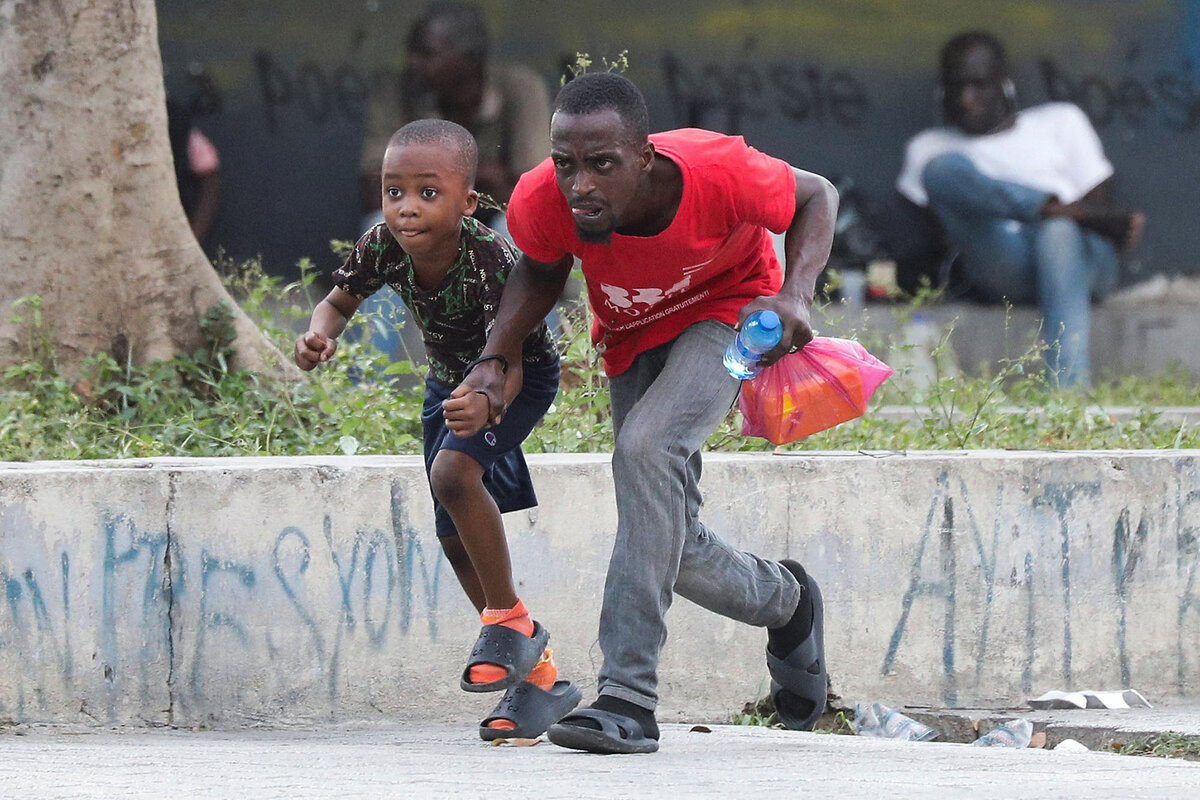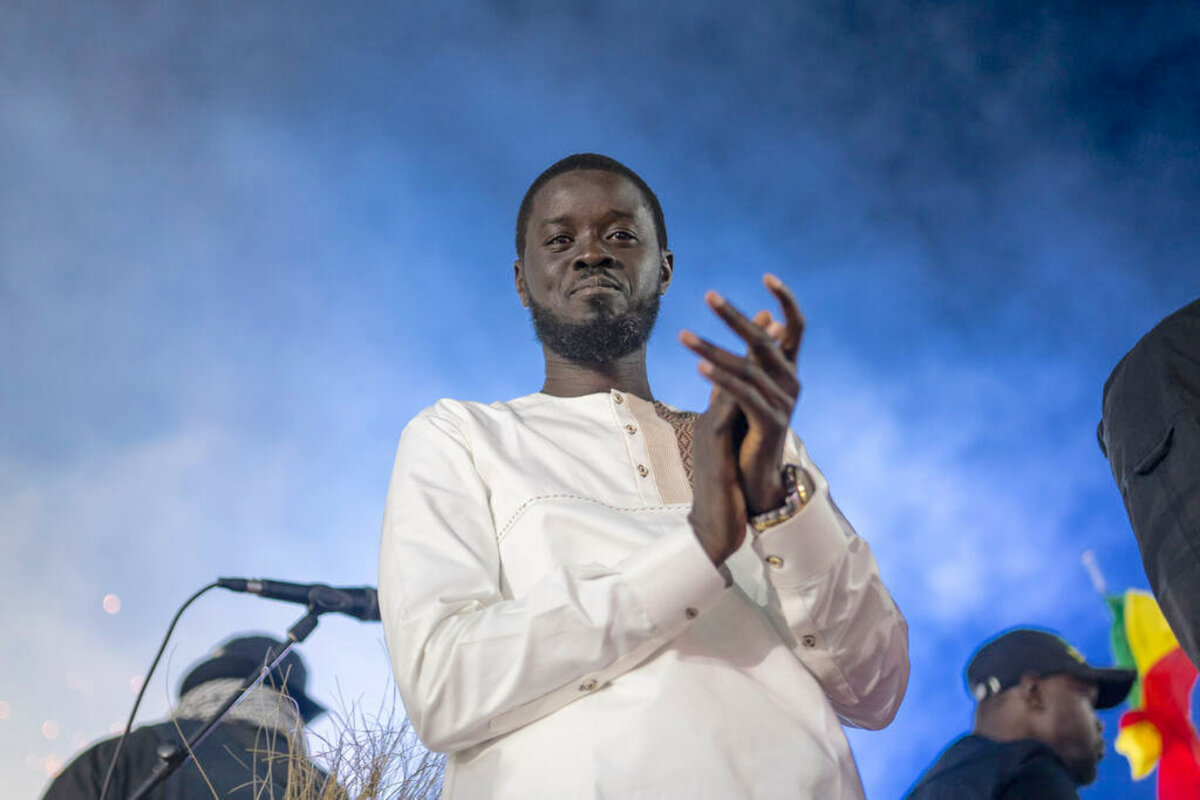While many Russians are trying to link Friday’s deadly terrorist attack to Kyiv, the more likely suspect is an older enemy: radical Islamists. Russia has diverted attention from them amid its war with Ukraine.

Why is Christian Science in our name?
Our name is about honesty. The Monitor is owned by The Christian Science Church, and we’ve always been transparent about that.
The Church publishes the Monitor because it sees good journalism as vital to progress in the world. Since 1908, we’ve aimed “to injure no man, but to bless all mankind,” as our founder, Mary Baker Eddy, put it.
Here, you’ll find award-winning journalism not driven by commercial influences – a news organization that takes seriously its mission to uplift the world by seeking solutions and finding reasons for credible hope.
Explore values journalism About usMonitor Daily Podcast
- Follow us:
- Apple Podcasts
- Spotify
- RSS Feed
- Download
 Amelia Newcomb
Amelia Newcomb
As we start the week, there’s lots of tumult to address on the global stage: a terror attack in Russia, deepening U.S.-Israel tensions over Gaza, sparring in Kenya over sending police to help in Haiti. You’ll find insightful takes on all those in today’s Daily.
You’ll also find news that tends to get overlooked. In New Haven, Connecticut, correspondent Troy Aidan Sambajon reports on a new community where housing is a salaried benefit for early childhood educators. It’s a nascent effort to address the immediate needs of desperately needed but often low-wage workers – and to build a village that more broadly sustains them. It’s innovation that lays the groundwork for sustainable progress. And that’s news.
Already a subscriber? Log in
Help fund Monitor journalism for $11/ month
Monitor journalism changes lives because we open that too-small box that most people think they live in. We believe news can and should expand a sense of identity and possibility beyond narrow conventional expectations.
Our work isn't possible without your support.
Today’s stories
And why we wrote them
( 5 min. read )
Today’s news briefs
• French warning: The government issued its highest-level alert following the terrorist attack in Moscow. France activates this alert when a terror threat is considered imminent.
• Senegal elects new president: Opposition candidate Bassirou Diomaye Faye, popular among youth, won the March 24 presidential election. A peaceful transition of power would forward democracy in West Africa, where there have been eight military coups since 2020.
• Russia escalates attacks on Ukraine: Multiple explosions hit Kyiv March 25 for the third time in five days. Russia has stepped up missile and drone strikes, and staged its biggest attack on Ukraine’s energy system in more than two years of war on March 22.
• U.S. emissions initiative: The Biden administration announces $6 billion in funding for projects that will slash industrial sector emissions. Iron, steel, aluminum, concrete, and cement facilities are some of the recipients for the largest-ever U.S. investment to decarbonize domestic industry.
( 3 min. read )
Donald Trump faced a huge bond – nearly half a billion dollars – to appeal a verdict in a civil fraud case. He got a reprieve Monday when an appeals court lowered the bond to $175 million. But other challenges await: His hush money trial now starts April 15.
( 6 min. read )
Israelis are keenly aware that the close bond between their country and the United States is fraying over the prolonged war in Gaza. But they blame politics and the U.S. election season for the shift.
( 5 min. read )
When should a country intervene in a crisis on the other side of the world? That is a burning question in Kenya, where the government has pledged to send a police contingent to restore law and order in Haiti.
( 5 min. read )
Child care in the U.S. is in crisis, with high prices for parents and low wages for child care providers. In Connecticut, one solution is to provide rent-free housing for those caring for small children.
The Monitor's View
( 2 min. read )
In recent years, the band of African countries straddling the southern edge of the Sahara has struggled with military coups, violent Islamist extremism, and a rejection of regional cooperation on security.
Now Senegal, through a presidential election held Sunday, is showing the antidote to those seemingly intractable problems. It resides in the cornerstones of democracy, such as judicial independence, equality, and vibrant civic participation.
“We are very proud in Senegal to be able to face all our opposition, our difficulties, our misunderstandings, in a democratic way,” Abdoulaye Bousso, director of the civil society group Aar Sunu Election (Protect Our Election), told Al Jazeera. “We have strong institutions.”
The election almost did not happen. Facing term limits that he himself pushed through, President Macky Sall tried to postpone his departure indefinitely. That bid stirred immediate head winds in a country that has never seen a coup d’état and where trust in institutions like the national military runs deep.
Protesters filled the streets. The Constitutional Council, Senegal’s highest court, rejected the delay. Compelled to reverse course, Mr. Sall consented to step down as required by the constitution by April 2 and released two popular opposition leaders he had imprisoned on questionable charges of corrupting youth and fomenting insurrection.
Anger turned to celebration. In a truncated campaign season lasting less than two weeks, 19 candidates filled the ballot – including the first woman ever to run for the presidency. Voter turnout Sunday exceeded 60% – a significant increase since 2022, when a majority of voters frustrated with corruption and economic decline sat out parliamentary elections. Balloting was peaceful. As results were still being counted, a majority of the candidates, including Mr. Sall’s hand-chosen successor in the ruling party, conceded.
Behind bars just 12 days ago, a former tax inspector and anti-corruption leader named Bassirou Diomaye Faye is now Senegal’s presumptive next president. The harmony of that outcome is striking – and not just in Africa, where democracy remains a relatively new experiment. And in a country that is more than 95% Muslim, it rebuts a regional trend suggesting that Islam and democracy are incompatible.
“An instrumental factor in Senegal’s political landscape has been its active and organized civil society, characterized by vibrant youth and social group activism, which has held public officials accountable for upholding term limits and democratic progress,” Emmanuel Yeboah, a regional analyst at the West Africa Democracy Solidarity Network, wrote last month.
At a time when even the world’s most established democracies face internal challenges, voters in Senegal offer proof that when set on values such as transparency and rule of law, the unwritten norms of self-government are secure.
A Christian Science Perspective
Each weekday, the Monitor includes one clearly labeled religious article offering spiritual insight on contemporary issues, including the news. The publication – in its various forms – is produced for anyone who cares about the progress of the human endeavor around the world and seeks news reported with compassion, intelligence, and an essentially constructive lens. For many, that caring has religious roots. For many, it does not. The Monitor has always embraced both audiences. The Monitor is owned by a church – The First Church of Christ, Scientist, in Boston – whose founder was concerned with both the state of the world and the quality of available news.
( 1 min. read )
We can turn to God as the power in our lives, and find Him caring for us and keeping us whole.
Viewfinder

A look ahead
We hope you enjoyed today’s Daily. Please come back tomorrow for a story related to a device many of us use every day: Apple’s iPhone. The U.S. Justice Department has filed an antitrust lawsuit against Apple. Writer Laurent Belsie takes on this question: If the United States needs a new level of regulatory vigilance on Big Tech, how should it happen?
Also, as a bonus read, please check out our Points of Progress this week, which looks at eco-friendly batteries and greener cement.








